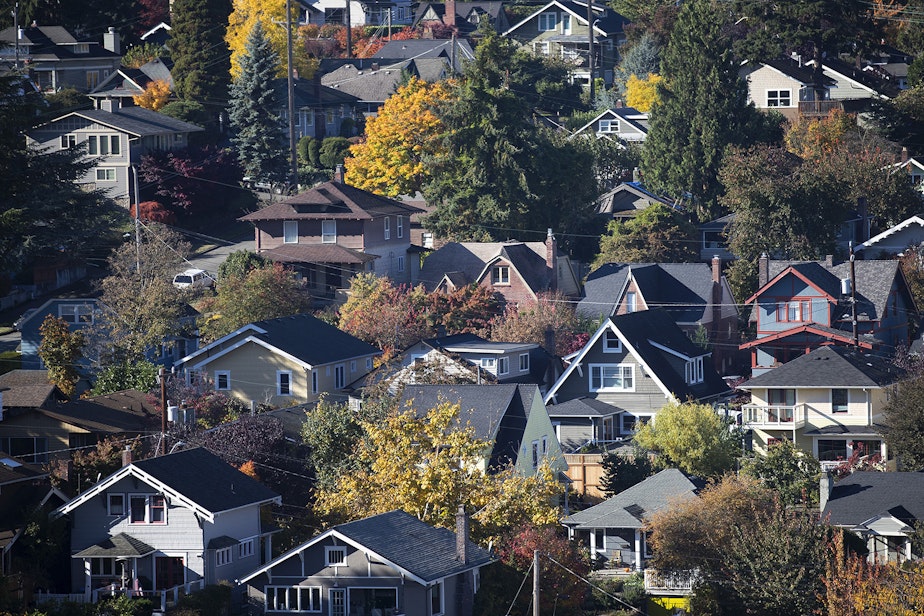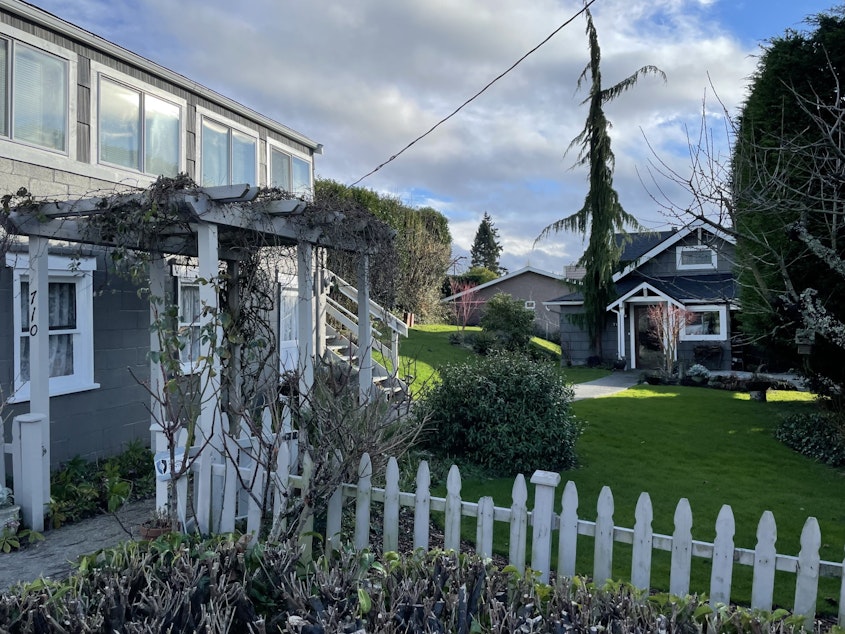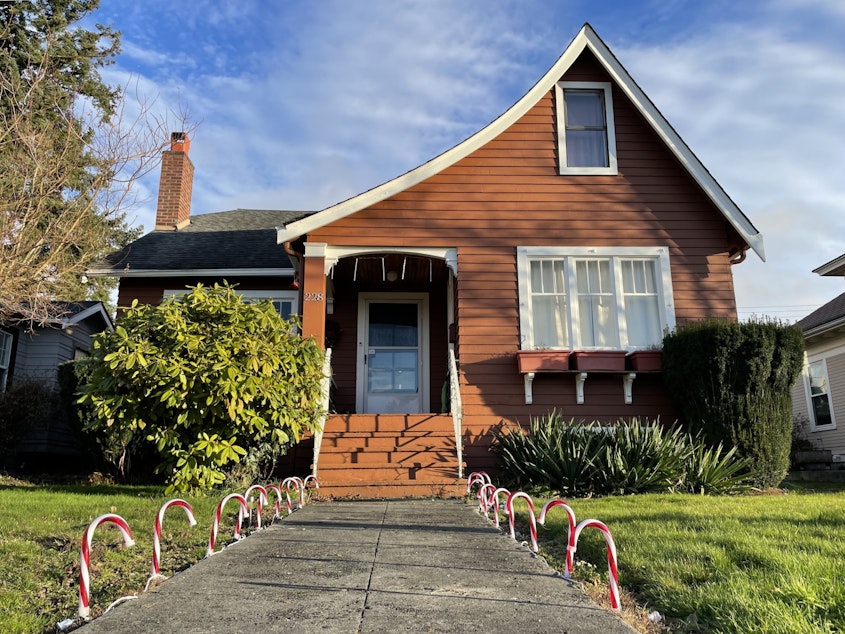Seattle sellers can 'kick back and let the market' decide what people will pay for their homes

Paying $1 million for a house is ( to buyers chagrin) now the norm in Bellevue and the Eastside. Now imagine paying $1 million on top of the list price.
It's a seller's market in western Washington. Buyers just want to live in it.
"Sellers can just kick back and let the market determine what the value of the home is," says Daryl Fairweather, the chief economist at Redfin. "They don't even have to bother pricing it accurately because there are just so many buyers out there who will compete in a bidding war."
Not even pandemic struggles could keep western Washington's real estate market down. The Seattle region faces escalating home prices, mortgages, and costs of living. The housing market is particularly pinched because supply has remained low for more than a year in western Washington. One solution, building up more dense housing, has lagged and shows little sign of improvement this spring.
Recently, a home in Bellevue sold for $1 million more than the asking price, $3.63 million. The original asking price was a whopping $2.65 million, high even for the Eastside where the median price for a house is now $1.7 million.
RELATED: This realtor wants to find you a house in Washington. The odds are stacked against her.
According to The Seattle Times, the broker managing the sale, Max Rombakh, received 14 offers above the asking price. A cash offer closed the deal.
Rombakh told the Times this sale is an anomaly.
Sponsored
While it may not indicate broader market trends, Fairweather says the market shows no signs of slowing down.
HOUSE HUNTING IN SELLER'S MARKET
Buyers in the Seattle area have lamented the level of competition and top-dollar price tags for homes for years. Fairweather says it's gotten even more competitive in 2021 and early 2022, partly because there are more prospective buyers hunting for a short supply of homes. As the 2022 season kicks off, people who were unable to land a home at the end of last year are now competing with people just starting their search.
"A lot of who people who were pausing on a move are now back in the market," she says. "We're still seeing plenty of demand of homes. And even slightly higher mortgage rates, right now, are not slowing down that demand."
Sponsored
The rental market isn't helping much.
"If rents weren't so high, I would expect people to rent instead of buy. But because rents are high, there really isn't any other option," Fairweather says. "That creates a lock-in effect for current homeowners, because current homeowners don't want to face the housing [or rental] market either."
That tracks.
According to new data from the Northwest Multiple Listing Service, the average single-family home in King County sold for about 7% more than the listing price last month. The above mentioned home in Bellevue sold for about 27% more.
What was so special about this house?
Sponsored
Fairweather says the most desirable homes are move-in ready — because the home improvement market is about as competitive as the housing market at the moment — and spacious, with room to work from home and at least three bedrooms; the Bellevue home has four.
Seattle's suburbs, and neighboring cities like Bellevue, are increasingly attractive as buyers look outside of the city's core where they can find more spacious homes with room for offices.

HOW TO ALLEVIATE THE HOUSING CRUNCH
The key takeaway, Fairweather says, is that the root cause of high-cost housing is we have a lack of supply. The market is lacking in low income and middle income housing, in-particular.
She says more housing, specifically more dense housing, is "the only thing that's going to get this under control and make housing more equitable for everybody." Otherwise, she says people will continue to get priced out of the market, especially people of color and low-wage earners.
"And unfortunately, they're going to have to leave Seattle," she said.
Washington state lawmakers and Governor Jay Inslee could get involved in the work of opening up single-family zones to other types of development, but some have called that that as politically risky.
Advocates say changing the zoning regulations would help cities find the "missing middle" of housing.
Sponsored
They argue the state's patchwork of local zoning laws isn't doing enough, so legislators are considering a bill to force the issue of denser housing options statewide.
House Bill 1782 originally aimed to make it possible for duplexes, triplexes and four-plexes to be added to single family zones, where they're currently illegal to build in many cities. The goal is to meet the need for new homes as people continue to move into Washington state.
The bill has so far survived efforts to torpedo that intent, including an amendment to exempt all cities except Seattle, but it has been altered in ways to make it more palatable to bipartisan opposition from municipal officials.
The bill survived a key deadline this week. It's next test will be in the House Rules Committee next Tuesday.
Update as of 3/17/2022: the bill did not advance in this legislative session

MONEY CAN'T BUY NONEXISTENT HOUSES
There's a limited supply of housing currently available and a limited amount of space where additional housing can be built (under current restrictions). It puts buyers in a position where they're escalating their home offers by 7% on average (as of February).
Workers who are with major tech corporations are in a better position to get a leg up - or afford to pay in cash.
Amazon announced this week that it's doubling the maximum base pay for tech and corporate employees to $350,000 a year. The company bills this as an effort to retain and attract talent in the tech industry, in which there is no shortage of options for qualified candidates.
Fairweather says that's just another sign that demand for housing is not likely to slow down. Higher wages can translate to more people who can afford to buy and more competitive offers.
That means the market may get not only more crowded but also more inequitable.
"Especially for people who are upper-class or upper-middle-class... their wages continue to grow, which means they just have even more money to throw at the housing market," Fairweather explains. "And since housing supply is constrained, the only place for that money to go is just into higher home prices."


